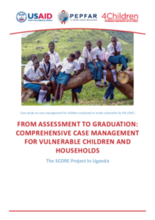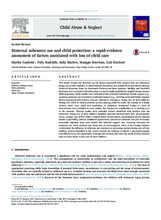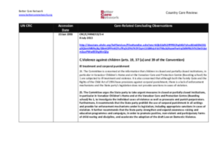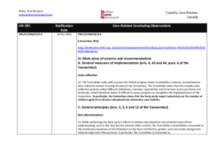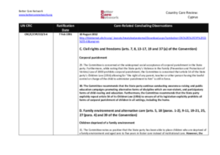Displaying 481 - 490 of 947
This video from MenCare Campaign describes the campaign's efforts in over 40 countries to overcome stigma, gender discrimination, and violence and empower men to become equal partners in caring for children.
This case study describes the case management system developed by the Sustainable Comprehensive Responses for Vulnerable Children and their Families (SCORE) project in Uganda.
In this webinar, Care to Practice's Lucy Hillier speaks to Jamie Lachman, founder and director of Clowns Without Borders South Africa, about the “Parenting for Life Long Health” programme being implemented in several countries in the Eastern and Southern Africa region.
This article reviews the literature on the factors associated with mothers who use substances losing care of their children.
This randomized control trial study used an intent-to-treat approach to examine whether a referral to a family group conference (FGC) was associated with re-referrals, substantiated re-referrals, or out-of-home placements among child welfare-involved families receiving in-home services.
This study aimed to describe caregivers' understandings of, and responses to, unsettled infant behaviours in Vietnam and their family caregiving contexts.
This country care review includes the care-related Concluding Observations adopted by the Committee on the Rights of Persons with Disabilities during the seventeenth session (20 March 2017 - 12 April 2017) of the Convention on the Rights of Persons with Disabilities.
This country care review includes the care-related Concluding Observations adopted by the Committee on the Rights of Persons with Disabilities during the seventeenth session (20 Mar 2017 – 12 Apr 2017) of the Convention on the Rights of Persons with Disabilities.
This country care review includes the care-related Concluding Observations adopted by the Committee on the Rights of Persons with Disabilities during the seventeenth session (20 March 2017 - 12 April 2017) of the Convention on the Rights of Persons with Disabilities.
This study explored the experiences of adoptive parents who chose to place their intercountry adopted child in out-of-home care due to the child's disability.

